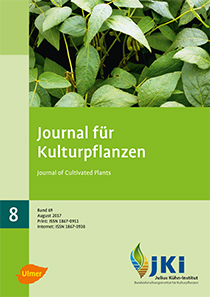First investigations of the biology of <em>Ascochyta sojina</em> Bedlan
DOI:
https://doi.org/10.5073/JfK.2017.08.04Keywords:
Soybean, Ascochyta sojina, seed transmission, infection pathway, resilience of varietiesAbstract
It has been proven for the first time that Ascochyta sojina can be transmitted by seed and penetrates the leaves through the stomata. The optimum growth temperature of the fungus is 25°C. A. sojina does not grow at temperatures over 30°C and below 5°C, however it remains viable.
In this study 85 soybean varieties were tested for their susceptibility towards A. sojina. An adjusted evaluation scheme was created to determine the infection rate and the resilience towards A. sojina. Most of the soybean varieties showed a resilience of 60%. There was no vertical resistance since the first leaves were more susceptible than the resilient seed leaves. A. sojina is the second most common phytopathogenic fungus on soybean in the investigated cultivated areas in Austria.
Downloads
Published
Issue
Section
License
The content of the journal is licensed under the Creative Commons Attribution 4.0 License. Any user is free to share and adapt (remix, transform, build upon) the content as long as the original publication is attributed (authors, title, year, journal, issue, pages).
The copyright of the published work remains with the authors. The authors grant the Journal of Cultivated Plants, the Julius Kühn-Institut and the OpenAgrar repository the non-exclusive right to distribute and exploit the work.







